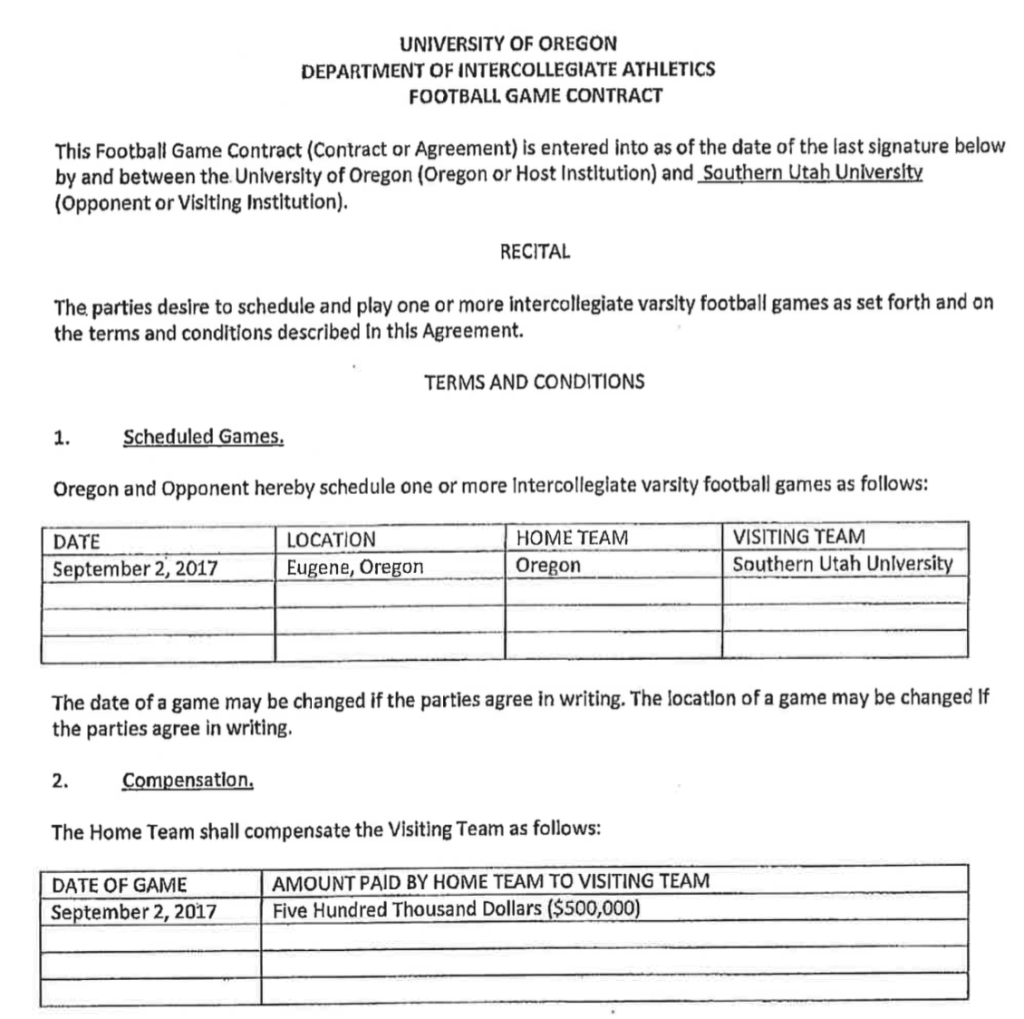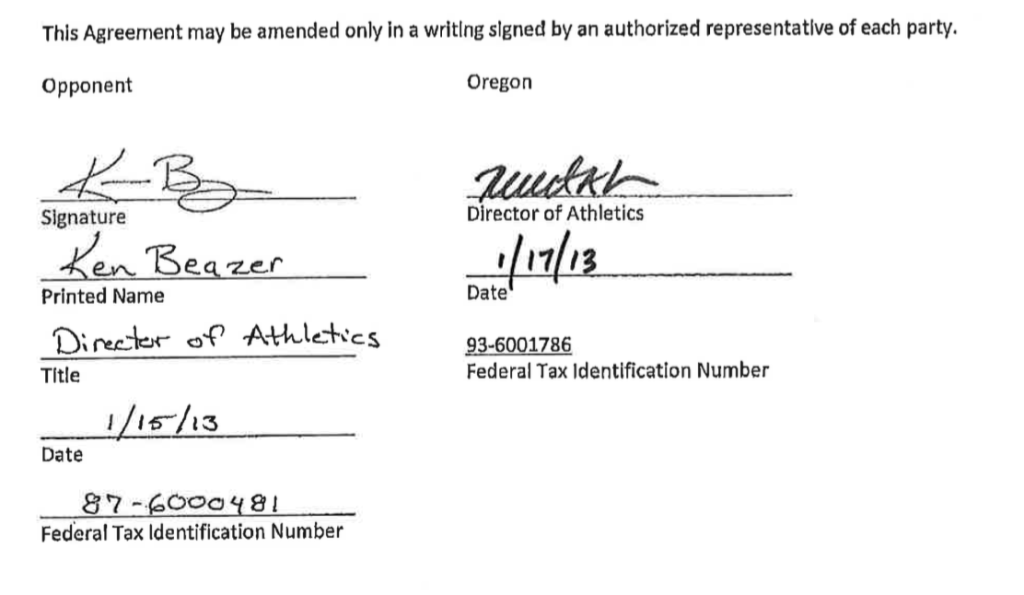OTC (Travel Oregon). 24 hours and 9 minutes from public records request to the document: From: Bill Harbaugh <wtharbaugh@gmail.com> Sent: Wednesday, April 8, 2020 1:08 PM To: Jeff Hampton <jeff@traveloregon.com> Subject: Re: Jeff Hampton shared “Oregon21 Grant OR212018 (9.18)” with you. Hi Jeff, I’m writing to request any reports made…
Posts tagged as “Public Records”
Thanks to a consistently helpful reader for the link. The fines were only $750 per violation, but it’s a start:
HB 2353 has now passed the Oregon House and Senate unanimously, and Governor Brown is expected to sign it soon: I like how the fine goes to the requester of the records. This emergency legislation is indeed necessary for the sake of the public peace. In the past year the…
5/17/2019 update:
The Oregonian’s Rob Davis reveals still more of the documents UO tried to hide from the public, including more new information about the redactions by Kevin Reed’s Public Record Office.
If I understand the story right, Reed’s office let the lobbying group decide what UO should redact from UO’s public records. They made some interesting choices. Weird. Full story here with links to all the records:
What UO didn’t want the public to know about industry group’s climate bill opposition
… The newly released documents documents include the alliance’s legislative updates, lobbyist reports and memorandums to members. The university originally contended portions of the documents were protected by the attorney-client privilege and by an exemption allowing material submitted confidentially to be withheld in very narrow circumstances.
Ed Finklea, the alliance’s natural gas director, told The Oregonian/OregonLive it was the energy alliance’s attorney who made the redactions when the university released the records. Molly Blancett, a school spokeswoman, said the university “always solicits the input of third parties when it comes to their records that have made their way to the university’s possession.”
The clean documents show a consistent theme in what was initially redacted: References to potential benefits of Brown’s proposed climate change bill. …
5/14/2019 update:
I have it from a generally reliable source that, as of yesterday, UO has withdrawn its membership in AWEC, the industry group that is lobbying against Governor Brown’s Cap and Trade legislation.
5/12/2019: It backfired. Rob Davis has the story in the Oregonian, here. A few snippets:
As the RG sinks into the abyss, the Eugene Weekly is doing a more and more impressive job in keeping tabs on local government, with the help of UO journalism students. Their latest: An Unsuccessful Solution … • Nearly 30 percent of people who completed the Community Court program have…
That would be the University of Maryland. The WaPo: A federal grand jury in New York investigating corruption in college basketball has requested records from Maryland regarding one unnamed former player, assistant coach Orlando “Bino” Ranson, and Silvio De Sousa, a recruit who ultimately attended Kansas. Maryland released copies of…
Max Thornberry has the story here: Transparency Committee Takes on UO Records Policy Student reporter denied paid-for public records A student reporter at the University of Oregon was charged more than $100 to obtain UO public records before being told the university would not release them to him. The reporter…
4/10/2018 repost, for no particular reason. 6/8/2014: Rumor down at the faculty club is that Gottfredson and Berdahl are closeted in McMorran House, working on a strategy to convince the Trustees to give Gottfredson another chance. From the meeting packet here: June 12, 12:00 pm: Trustees roundtable discussion with Bob Berdahl Ford Alumni Center, Room 403 Presumably Berdahl will be introduced to the board as former…
1/1/2018: Andrew Greif has the news here. Oderinde put 3 UO students in the hospital and kept his job for a year anyway. I’m not sure if Duck FAR Tim Gleason ever gave up the public records on his “investigation” of Oderinde. Say, I wonder if Dr. Skaggs ever got…
8/25/2017: While the Ducks are so broke they can’t pay for tutoring their student-athletes, they’ve got no problem paying Southern Utah $500K to show up and lose the football season’s opener next weekend. The contract is below.
10/13/2015: It’s not really a fair contest. While for years the UO administration has used its Public Records Office and their $300K budget to delay, redact, and charge excessive fees to frustrate the intent of Oregon’s public records law, the PRO’s at most other universities are in the business of making public records public. Here’s the latest example.
Monday morning I emailed identical public records requests to UO and Southern Utah University, asking for copies of the contract for the football body-bag game scheduled for September 2017:
Date: October 12, 2015 at 10:14:21 AM PDT
To: Lisa Thornton <pubrec@uoregon.edu>
Subject: public records request, football game contract with SUU
Dear Ms Thornton –
This is a public records request for a copy of the football game contract between SUU and UO, for the game to be played in the fall of 2017.
A sample of the sort of contract I am looking for is here: https://dl.dropboxusercontent.com/u/971644/uomatters/IAC/Football%20contract%20-%20Georgia%20State%20(Final%20Executed%20Version).pdf
I edit a news and opinion blog about the University of Oregon, and I ask for a fee waiver on the basis of public interest.
I would appreciate it if you could send a pdf copy of this contract to this email address.
Thanks for your assistance
This sort of request typically takes UO a week or two. But SUU responded in less than 24 hours:
From: Jennifer Oberhelman
Date: October 13, 2015 at 9:13:01 AM PDT
To: uomatters@gmail.com
Subject: GRAMA Response
Good morning Mr. Harbaugh,
Attached is the contract between Southern Utah University and University of Oregon for a football game set for 9/2/17 in Eugene, OR requested 10/12 in the form of a GRAMA request.
Please contact me if you have any additional questions.
Thank you.
Jennifer Oberhelman
Exec. Asst. for Administration
“We don’t quit playing because we grow old, we grow old because we quit playing.”
Not bad, though the record is still the 50 minutes it took Georgia State to provide their contract, and Eastern Washington’s General Counsel only took 3 hours.
So Rob Mullens will pay SUU $500K to come to Eugene. Presumably AAD Eric Roedl will get the cash by raising the price he charges ASUO for “free” student tickets to these body-bag games:
…
9/14/2015: Georgia State Panthers whip Oregon Ducks in football public records release
From https://olis.leg.state.or.us/liz/2017R1/Downloads/MeasureDocument/SB481/A-Engrossed Lots of testimony from Pete Shepherd, who as Deputy AG did so much to destroy the promise of Dave Frohnmayer’s public records law – and famously lost the PERS case to the Oregonian, while working for Harrang et al. The new law, which comes out of AG Ellen Rosenblum…
Update: Sorry, there is no such offer for real UO faculty. UO is planning to lay off ~75 non-tenured and pro-tem faculty in RL, AAD, CoE, and the SOJC with no buyout at all. But things are a little different over in Rob Mullens’ heavily subsidized Duck athletic empire. The Oregonian’s…
Reporter Jack Pitcher has a good report on the bad UO Public Records situation, in the Emerald here: Multiple University of Oregon students were arrested this year, an assistant football coach was paid over $60,000 for less than a week of work and one visit to campus by an author…
An anonymous reader has been trying for months to get some simple public records from UO. They filed the request with the UO Public Records Office, they eventually got an estimate of the costs, and they paid it. Their check was cashed by UO. Then they waited some more. Months more. They…
3/1/2017: ESPN picks up the story, here: The University of Oregon is writing a new policy that could make coaches’ disciplinary records inaccessible to the public under Freedom of Information Act laws. According to The Register-Guard, the policy “explicitly says the personnel records of about 1,400 staff members, called ‘officers…

